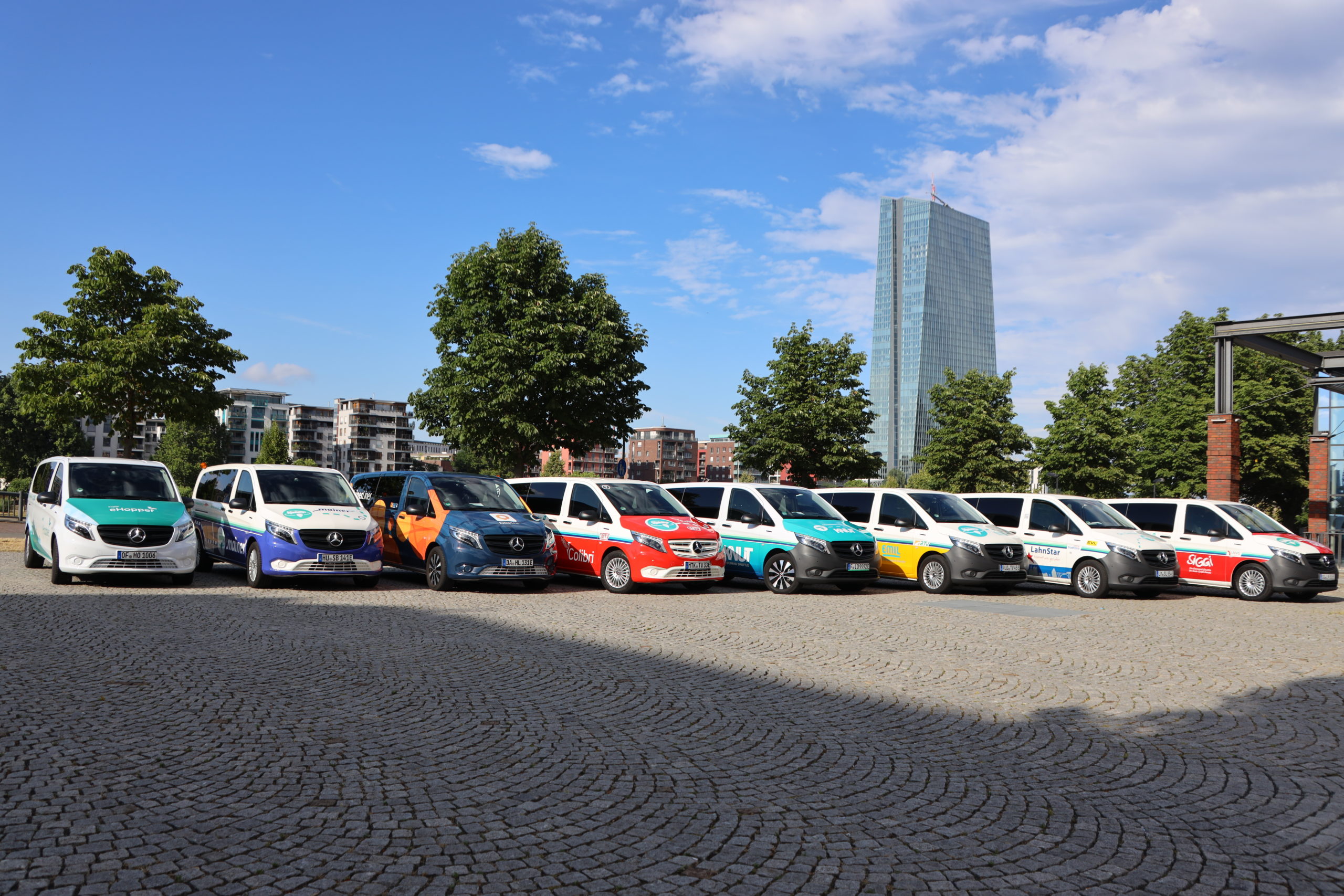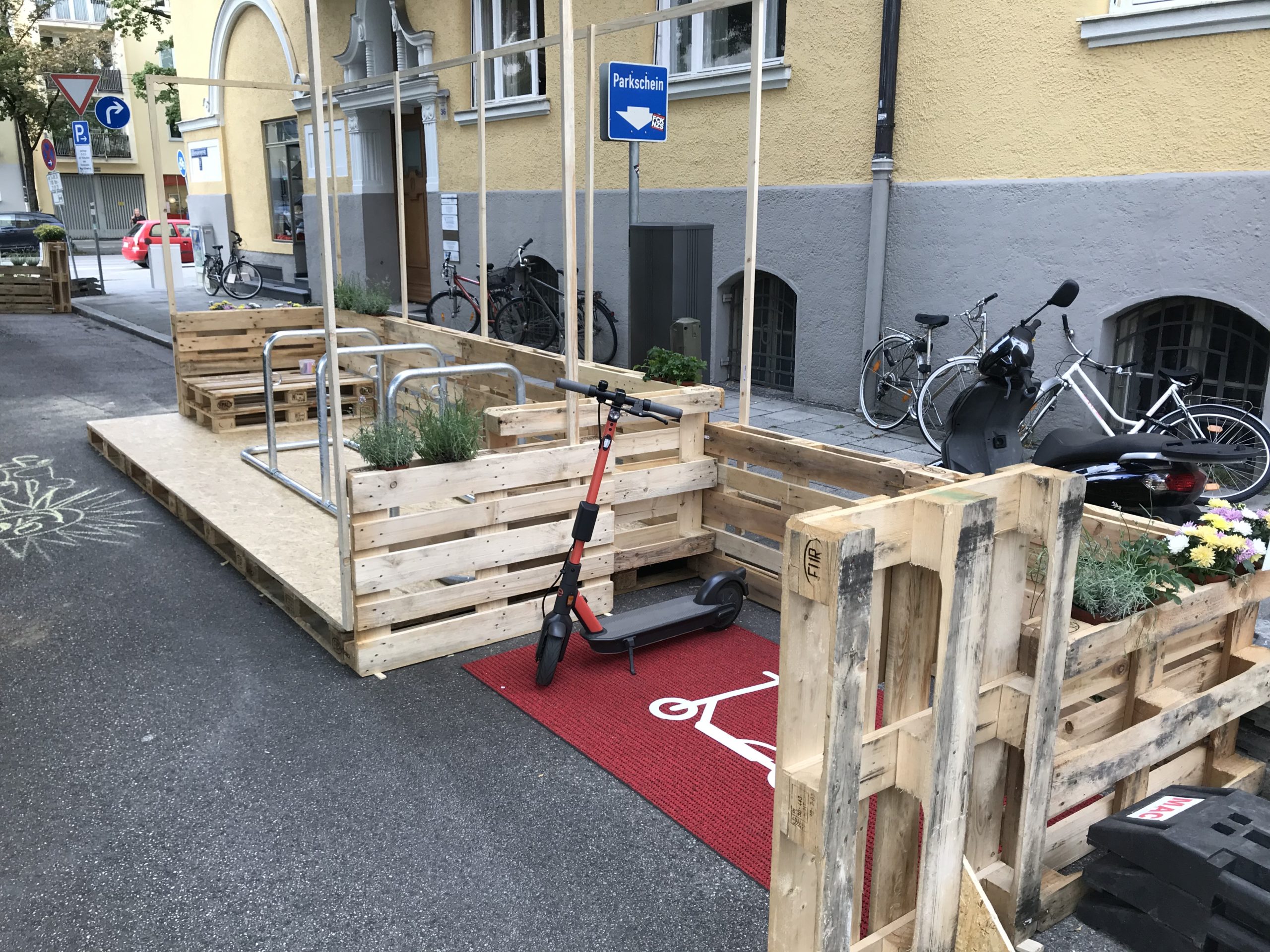Shortlist 2022
DMP | Good Practice
Challenge: Networking
Adaptive City Mobility (ACM): The e-mobility solution for urban fleet operators
Adaptive City Mobility (ACM): The e-mobility solution for urban fleet operators
Worldwide, fleet operators of electric vehicles are struggling with a number of challenges, including a lack of affordable and clean mobility, range limitation of vehicles or excessive costs for upgrading the power grid. The ACM project has developed a holistic e-mobility system as a solution approach for fleet operators in cities: a multifunctional B2B fleet vehicle can be rented by several fleet customers via the ACM sharing platform as well as used in different applications such as taxi, sharing, logistics and tourism. Through B2B sharing, ACM replaces private vehicles in cities. The energy solution used ties in with the existing infrastructure of cities – which is why the electric vehicles can be used immediately around the world without the need for further expansion of the power grid.
Project Website Project WebsiteChallenge: Accessibility
On-demand mobility for the Frankfurt/RhineMain region: transport on demand for the first and last mile
On-demand mobility for the Frankfurt/RhineMain region: transport on demand for the first and last mile
Simple, convenient and environmentally friendly – “on-demand mobility for the Frankfurt/Rhine-Main region” combines classic public transport with offers of digitally driven, new mobility. It thus creates real added value for the passenger: gaps in public transport services are closed with emission-free vehicles and more sustainable mobility is made possible. This means that up to 1.8 million people in the metropolitan region will receive an environmentally friendly and digital supplement to public transport on the first and last mile. The project enables attractive, digital public transport in suburban and rural areas and thereby reduces NO2 production.
Project Website Project WebsiteDMP | Knowledge Transfer
Challenge: Transformation
citizen mobility – UMPARKEN: Mulimodal mobility solutions
citizen mobility – UMPARKEN: Mulimodal mobility solutions
Multimodal mobility solutions Urban mobility occasionally reaches its capacity limits. In order to avoid high CO2 and noise emissions in the future and also to ensure safety and a low land consumption of mobility, we have to rethink the way we get around. In the UMPARKEN project, eight households swap their cars for a mobility budget of 300 euros for four weeks and switch to multimodal solutions. The parking space freed up in this exchange is redesigned for alternative use in the interests of the residents. The pilot project, which saw the participation of citizens, municipalities, science, business and start-ups, provided important insights into the potentials and challenges of multimodal mobility and living without a car.
Project Website Project WebsiteChallenge: Networking
Network of state-funded posts for sustainable mobility in Baden-Württemberg
Network of state-funded posts for sustainable mobility in Baden-Württemberg
In order to promote and implement a sustainable change in transport in Baden-Württemberg through mobility projects, the Ministry of Transport funds staff positions in various areas of sustainable mobility. The 112 currently funded positions are coordinated and networked on a topic-specific basis. The new mobility experts play a central role in project coordination and implementation of measures for sustainable mobility, digitalisation and climate protection in transport. They act as a bridge between the state and the municipalities in the transportation and implementation of the state’s goals. The state-wide network thus facilitates uncomplicated networking and the transfer of knowledge between the agencies in order to effectively advance the transport transition and mobility of the future.
Project Website Project WebsiteDMP | Change
Challenge: Transformation
eFarm: Hydrogen from North Friesland
eFarm: Hydrogen from North Friesland
Pragmatic, Nordic, green: the eFarm joint project initiated by GP JOULE is located in the district of North Friesland. The largest sustainable hydrogen mobility project in Germany relies on regeneratively produced, green hydrogen. The principles behind it come from agriculture, namely diversity over monoculture, optimal synergy over optimal individual use and, above all, holistic thinking: generation, distribution and use are thought of together. Hydrogen is produced from surplus wind power in five electrolysers. Two filling stations supply two fuel cell buses and 30 cars. About 3,000 people are involved in the project through the 20 shareholders. The eFarm shows us that community-based, sustainable management is possible and that emission-free, local transport benefits everyone – both people and the environment.
Project Website Project WebsiteChallenge: Transformation
e.Volution: The commuter shuttle system
e.Volution: The commuter shuttle system
e.Volution is a shuttle system for commuters that reduces car traffic at peak times. Employers can make it available to their employees for free rides. The corporate shuttle combines increasing commuter traffic, space saving, energy saving and C02 reduction, while at the same time offering people an individualised, comfortable and flexible driving experience. If it is possible to transport an average of five people to work in the shuttles, which can hold up to seven people, the system will mean five private cars are no longer on the roads. This will save 80 per cent space and reduce C02 emissions by 25 per cent. The META shuttle is a barrier-free electric Circular Economy vehicle that has an especially long service life and was developed in such a way that its production is extremely resource efficient. In the start-up phase, e.Volution is cooperating with Telekom at the Bonn site, with the Aachen city region at the Merzbrück site, with the Coesfeld district in Münsterland and with the city of Bochum at the Mark 51°7 site (formerly the Opel plant).
Projekt Website Projekt WebseiteDMP | Data and Innovation
Challenge: Inclusion
MOTIS Project: Sustainable and inclusive travel made easy
MOTIS Project: Sustainable and inclusive travel made easy
MOTIS is an application that makes finding sustainable connections with different modes of transport (e.g. park and ride, bike, car and e-scooter sharing and public transport) as easy as reaching for the car key. Among other things, the project is currently working on MOTIS being able to calculate barrier-free travel chains on a profile basis – this includes, for example, the exclusion of transfers if no boarding aid is available at the time of boarding or alighting. In such a case, the application figures out the best alternatives. The project is thus an important step towards providing more inclusive Mobility as a Service offers.
Project Website Project WebsiteChallenge: Networking
OPENER next: Next stop: Accessibility!
OPENER next: Next stop: Accessibility!
The vision of OPENER next is to make public transport more attractive. The aim is to promote an inclusive society on the one hand and to advance a sustainable mobility revolution on the other. The project’s approach is based on social cooperation, which means that citizens can contribute to recording and updating stops and their characteristics using a data collection app (OpenStop). What makes this special is that not only is the responsibility for data collection shared amongst several people, but the collection also takes place continuously and according to demand. In the spirit of “for each other”, the data collected is freely available to everyone. The aim of the project is to encourage more people to use the bus and train more often.
Project Website Project WebsiteDMP | International
Challenge: Data
Transport Data Commons Initiative (TDCI): Sammlung von Daten aus dem Verkehrssektor
Transport Data Commons Initiative (TDCI): Sammlung von Daten aus dem Verkehrssektor
In many countries and cities, access to transport data is difficult, the quality of the available data is low or the data is not collected at all. To address this, the Transport Data Commons Initiative was jointly founded in May 2022 by 18 organisations based all over the world. The goal of the project is to capture the connection between transport and climate. At this point, the initiative is therefore initially focusing on reporting data from the transport sector that is needed to derive the sector’s greenhouse gas emissions. The vision behind the project is to develop a common and open source data platform that can be accessed and used by all. The purposes behind it can be different: they include evidence-based neighbourhood improvement, modelling greenhouse gas emissions for rural or urban areas, and considering which transport mode mix will improve air quality and other environmental impacts.
Challenge: liveable city
VelObserver: Subjective assessment of the quality of the cycling infrastructure
VelObserver: Subjective assessment of the quality of the cycling infrastructure
Most cities lack an infrastructure that makes cycling a pleasant and comfortable transport experience. In order to promote this sustainable means of transport in a future-oriented way, it is necessary to consistently focus infrastructure construction on perceived and subjective safety. However, up to now there has been no data on precisely this. The VelObserver project therefore collects this data using a unique approach across the board and through crowdsourcing in the city of Zurich. Cyclists give their opinion on their personal feelings for different segments. In this way, over 40,000 assessments have been recorded in recent months, which also make progress visible and serve the city of Zurich as a planning basis for the further development of the bicycle network.
Project Website Project WebsiteDMP | Young Vision
Challenge: liveable city
Second Ride: Electrify your moped
Second Ride: Electrify your moped
With Second Ride, users with a moped from cult brand “Simson” can use a conversion kit to convert their vehicle’s combustion engine to an electric motor. Only the drive train is replaced; structural and body parts as well as interior fittings are reused according to the principles of a circular economy. The conversion makes electric mobility more ecologically, economically and socially sustainable. Co-founder and inventor Carlo Schmid is responsible for the technical development and has led the conversion kit to TÜV certification and road approval.
Project Website Vote nowChallenge: liveable City
Powerbänk: Battery charging for electric vehicles via app
Powerbänk: Battery charging for electric vehicles via app
For some years now, e-mobility and electric vehicles have been gaining in importance for private users. However, the number of publicly accessible charging stations is far from sufficient to meet the demand. In addition, not all private users have the possibility to charge their electric vehicles at home.
Project Website Project Website
This is where the project comes in: Powerbänk offers to order a battery charge for the private electric vehicle via app. After ordering, a mobile battery pack is delivered to the location of the electric vehicle, connected and collected again after a successful charging process. The project thus offers solutions to various problems of electric traffic in the city: mobile charging can drastically reduce the search for charging stations and have a significant positive impact on urban traffic flow.DMP | Science Fiction
Challenge: Transformation
Sunglider Smart Uberground Metro: The future rides on the solar track
Sunglider Smart Uberground Metro: The future rides on the solar track
What could the public transport of the future look like? The Sunglider Smart Uberground Metro project offers an answer to this question. Sunglider is a smart, 100 per cent photovoltaic-powered underground metro for medium-sized cities. The future-oriented model relies on self-driving, hovering gliders for people and goods as well as autonomous shuttles on the ground for the last mile. The Uberground Metro connects the city with the city ring and the old town, as well as with the surrounding towns and communities. In this way, metropolitan space and rural zones grow together to form the “mezzopolis” of the future. Glider stops offer narrow, space-saving island stops. In addition, mobility hubs, post depots, PV electricity charging points and wait-free transfer points for ground shuttles or metro-owned pedelecs and e-scooters are located on the ground.
Project Website Project WebsiteChallenge: Sustainability
Veloroute H2O: The floating cycle path
Veloroute H2O: The floating cycle path
Veloroute H2O is a concept for a ferry system for bicycles that connects the two sides of Kiel’s city centre. It was developed by Bashar Zapen, who is a student at the Muthesius Academy of Fine Arts. An electric, autonomous ferry transports cyclists across Kiel Fjord, powered by wind and tidal turbines. The floating cycle path complements Kiel’s network of cycle paths, so that Kiel residents no longer have to rely on detours by public transport or private vehicles to cross the fjord.
Project Website Project WebsiteDMP | Art
Challenge: Inclusion
Traumschüff: Floating travelling theatre for rural areas
Traumschüff: Floating travelling theatre for rural areas
The non-profit theatre cooperative Traumschüff runs “Theatre in the River”, a floating touring theatre that primarily travels in rural areas. It deals with the perspectives and themes of the region being visited. The flexible stage ship doubles as a houseboat and generates solar power, which can also be used to operate the stage equipment. Since 2017, the Traumschüff has been touring Brandenburg, Saxony-Anhalt and Mecklenburg-Western Pomerania for several months every summer. Many of the locations currently have no professional theatre operations of their own, so the project aims to fill this gap and supplement the existing cultural offerings. It hopes to provide professional, easy-to-understand and entertaining theatre that offers depth and at the same time draws attention to sustainability in mobility.
Project Website Project WebsiteChallenge: liveable city
Parasite Parking: Intervention in public space
Parasite Parking: Intervention in public space
The Parasite Parking project is an intervention in public space: the multifunctional platform disguised as a parking space – the parasite – can transform itself at any time and flexibly adapt to its surroundings and use. The platform is an uninvited guest on the spaces that are available to all as part of society and yet are mostly occupied only by steel bodies of modernity. Parasite Parking de- and recodes public space. The parasite does not ask about ownership and its rules, but about the limits of the usability of public space and its formulas of mobile and flexible forms of use. It comes and goes, depending on how long it can inhabit a niche.
Project Website Project WebsiteDMP | People
Katja Diehl
Katja Diehl
Katja Diehl has acquired expertise on sustainability with a focus on future mobility throughout her professional career. The mantra of her work is: “Everyone should have the right to live a life without owning a car. She writes a blog, runs the podcast “SheDrivesMobility” and is active on social media as well as on stage. She is also involved in the national board of Verkehrsclub Deutschland e. V., in the Hamburg representation of womeninmobility and as an advisor to the Austrian Minister for Climate Protection. Her book “Autokorrektur. Mobilität für eine lebenswerte Welt ” will be published in 2022. Her core competence is to turn things upside down in a communicative way – in favour of a human-centred change in transport.
Katja Diehl’s vision for the future is a child-friendly, climate-friendly, accessible, decelerated mobility that aims for equality. Privileges for cars should be reduced and parking spaces and streets should be designed primarily for cyclists and pedestrians. She sees a change in attitude and behaviour as the greatest challenge of the transport revolution.
Sylvia Lier
Sylvia Lier
Sylvia Lier is an expert on multimodal personal mobility and a thought leader on the topic of mobility budgets. She has many years of experience in the areas of fleet management and leasing, sharing economy including mobility platforms and public transport. She has not only written numerous articles and given lectures on the topic of mobility budgets, but has also founded her own LinkedIn community, Mobility Budget, with almost 500 members. The results of the monthly grouping are made freely available to the public.
Sylvia Lier’s vision of future company mobility is about an actual mobility turnaround, with the goal of an urgently needed reduction in CO2. In doing so, she relies less on car-centred concepts and more on concepts that are sustainable, multimodal and climate-friendly. This includes attractive public transport, cycling, and the use of shared mobility offers. Employers could make the use of different mobility offers accessible to their employees by providing mobility budgets.
DMP | Audience Award
For the DMP | Audience Award, only the audience decides. The audience award shows who or what is particularly important to citizens for the future of mobility. The DMP | Audience Award goes to the person or project that received the most votes in the online voting. The announcement will be made at the awards ceremony on October 27.





















